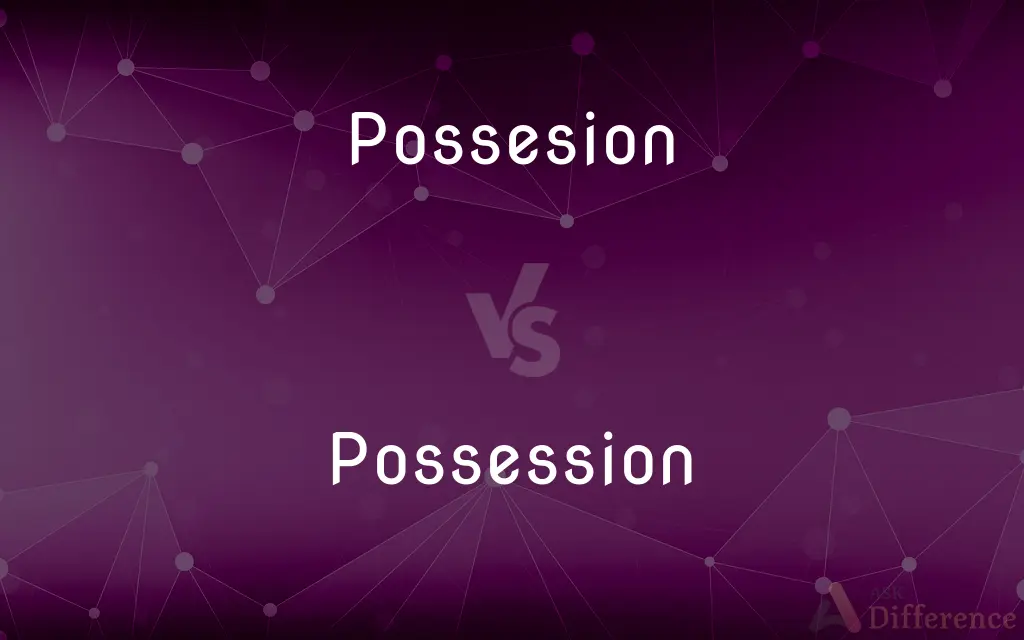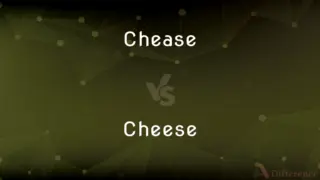Possesion vs. Possession — Which is Correct Spelling?
Edited by Tayyaba Rehman — By Fiza Rafique — Updated on April 2, 2024
"Possesion" is a misspelling. The correct spelling is "possession," referring to the act or fact of owning something.

Table of Contents
Which is correct: Possesion or Possession
How to spell Possession?

Possesion
Incorrect Spelling

Possession
Correct Spelling
ADVERTISEMENT
Key Differences
Remember "possible," double S in the middle.
Think: "You need double S's to own something fully."
Associate "possession" with having something, as in "I 'possess' it."
"Possession" has two S's in the middle and two at the end.
Use the mnemonic: "Persons Owning Stuff Say Every Single Item’s Owned Now."
ADVERTISEMENT
How Do You Spell Possession Correctly?
Incorrect: The ancient artifact is now in the museum's possesion.
Correct: The ancient artifact is now in the museum's possession.
Incorrect: The team is working on improving their possesion of the ball during games.
Correct: The team is working on improving their possession of the ball during games.
Incorrect: I'm not sure of the legal possesion of this document.
Correct: I'm not sure of the legal possession of this document.
Incorrect: Her possesion of multiple properties makes her a significant landlord.
Correct: Her possession of multiple properties makes her a significant landlord.
Incorrect: He was arrested for the possesion of stolen goods.
Correct: He was arrested for the possession of stolen goods.
Possession Definitions
The act or fact of owning something.
The house is in my possession.
Something that is owned or possessed.
My most cherished possession is a family heirloom.
The state of being controlled or dominated, as by an idea or emotion.
He was in possession of a great idea.
The act or fact of possessing.
The state of being possessed
The land's possession by the town.
Something owned or possessed
Removed his possessions from the desk.
A territory subject to foreign control.
Power or control over something
Possession of a firearm.
Occupation or control of a piece of property, with or without ownership.
A right of occupation and use
The tenant has possession of the apartment until the end of the lease.
The crime of possessing an illegal drug.
The state of being dominated or controlled by a demon or spirit.
The state of being occupied or obsessed with something, such as an idea.
Physical control of the ball or puck by a player or team.
An instance of this
Ideally, we would score on each possession.
Control or occupancy of something for which one does not necessarily have private property rights.
Something that is owned.
The car quickly became his most prized possession.
I would gladly give all of my worldly possessions just to be able to do that.
Ownership; taking, holding, keeping something as one's own.
The car is in my possession.
I'm in possession of the car.
A territory under the rule of another country.
Réunion is the largest of France's overseas possessions.
The condition or affliction of being possessed by a demon or other supernatural entity.
Back then, people with psychiatric disorders were sometimes thought to be victims of demonic possession.
The condition of being under the control of strong emotion or madness.
(sports) Control of the ball; the opportunity to be on the offensive.
The scoreboard shows a little football symbol next to the name of the team that has possession.
(Australian rules football) A disposal of the ball during a game, i.e. a kick or a handball.
(linguistics) A syntactic relationship between two nouns or nominals that may be used to indicate ownership.
Some languages distinguish between a construction like 'my car', which shows alienable possession — the car could become someone else's — and one like 'my foot', which has inalienable possession — my foot will always be mine.
(obsolete) To invest with property.
The act or state of possessing, or holding as one's own.
The having, holding, or detention of property in one's power or command; actual seizin or occupancy; ownership, whether rightful or wrongful.
The thing possessed; that which any one occupies, owns, or controls; in the plural, property in the aggregate; wealth; dominion; as, foreign possessions.
When the young man heard that saying, he went away sorrowful, for he had great possessions.
Ananias, with Sapphira his wife, sold a possession.
The house of Jacob shall possess their possessions.
The state of being possessed or controlled, as by an evil spirit, or violent passions; madness; frenzy; as, demoniacal possession.
How long hath this possession held the man?
To invest with property.
The act of having and controlling property
Anything owned or possessed
Being controlled by passion or the supernatural
A mania restricted to one thing or idea
A territory that is controllled by a ruling state
The trait of resolutely controlling your own behavior
(sport) the act of controlling the ball (or puck);
They took possession of the ball on their own goal line
Control or occupancy of a territory or place.
The military took possession of the region.
In sports, control of the ball or puck by a team.
Our team maintained possession throughout the game.
Possession Meaning in a Sentence
Losing possession of the ball cost the team the game.
The haunted house is rumored to be in the possession of a ghost.
They took possession of the land after a long legal battle.
His possession of rare coins made him famous among collectors.
The player's skillful possession of the ball impressed the scouts.
The law prohibits the possession of certain substances.
Finding the lost necklace back in her possession brought her joy.
Possession of this certificate qualifies you for a higher salary.
To gain possession of the artifact, they had to solve a series of puzzles.
She has a large collection of books in her possession.
The possession of a valid ID is required to enter the building.
The government can take possession of property for public use in some cases.
He took possession of the office after the former director retired.
The family regained possession of their ancestral home.
He proudly showed us the newest addition to his possession.
Their strategy focuses on maintaining possession of the ball for as long as possible.
The possession of a library card gives you access to thousands of books.
Possession of digital skills is increasingly important in the job market.
In many sports, possession of the ball is key to winning.
Unauthorized possession of this material is against the law.
Maintaining possession of your passport during travel is essential.
The police report noted the possession of stolen items in the suspect's home.
Her grandmother's ring is her most cherished possession.
The ancient scrolls came into their possession after many years of searching.
Possession Idioms & Phrases
In possession of
Having or holding something.
The player is now in possession of the ball.
Come into possession of
To obtain or receive something.
She came into possession of an antique vase unexpectedly.
Out of possession
No longer having or holding something.
The ball went out of possession when it was intercepted.
Possession is nine-tenths of the law
A phrase meaning that ownership is easier to maintain if one has possession of something, and difficult to enforce if one does not.
He claimed the land through the principle that possession is nine-tenths of the law.
Take possession of
To acquire control or ownership of something.
They will take possession of the new house next month.
Common Curiosities
Which vowel is used before possession?
"A" as in "a possession."
What is the verb form of possession?
"Possess."
What is the singular form of possession?
Possession.
Which conjunction is used with possession?
Any conjunction can be used based on the context.
What is the root word of possession?
The root word is "possess."
Which article is used with possession?
"The" as in "the possession of wealth."
Is possession an abstract noun?
It can be, especially when referring to non-tangible things.
Why is it called possession?
The term "possession" originates from Latin, signifying the act of occupying or having control over something.
What is the pronunciation of possession?
/pəˈzɛʃən/
Which preposition is used with possession?
"Of" as in "possession of the property."
Is possession a countable noun?
Yes.
How many syllables are in possession?
Four.
What part of speech is possession?
Noun.
What is the opposite of possession?
Lack or absence.
What is the first form of possession?
Possess.
What is the plural form of possession?
Possessions.
Is possession a negative or positive word?
Neutral; its connotation depends on context.
Which determiner is used with possession?
"This" as in "this possession is valuable."
Is possession a noun or adjective?
Noun.
Is possession a collective noun?
No.
How do we divide possession into syllables?
pos-ses-sion.
What is another term for possession?
Ownership.
What is the second form of possession?
Possessed.
Is possession a vowel or consonant?
"Possession" is a word that contains both vowels and consonants.
What is the third form of possession?
Possessed.
How is possession used in a sentence?
"The car came into her possession last year."
Is possession an adverb?
No.
Is the possession term a metaphor?
Not inherently, but can be used metaphorically.
Is the word possession imperative?
No.
What is a stressed syllable in possession?
"ses."
Share Your Discovery

Previous Comparison
Chease vs. Cheese
Next Comparison
Warrent vs. WarrantAuthor Spotlight
Written by
Fiza RafiqueFiza Rafique is a skilled content writer at AskDifference.com, where she meticulously refines and enhances written pieces. Drawing from her vast editorial expertise, Fiza ensures clarity, accuracy, and precision in every article. Passionate about language, she continually seeks to elevate the quality of content for readers worldwide.
Edited by
Tayyaba RehmanTayyaba Rehman is a distinguished writer, currently serving as a primary contributor to askdifference.com. As a researcher in semantics and etymology, Tayyaba's passion for the complexity of languages and their distinctions has found a perfect home on the platform. Tayyaba delves into the intricacies of language, distinguishing between commonly confused words and phrases, thereby providing clarity for readers worldwide.


































